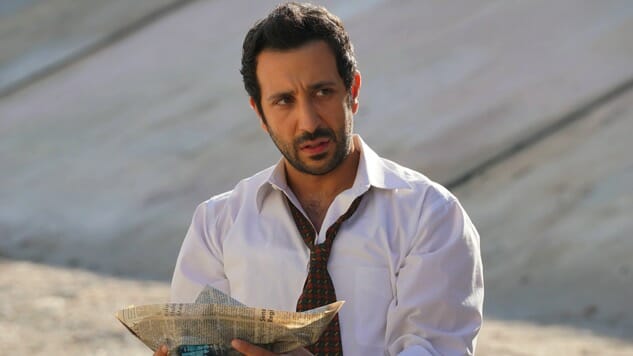You’re the Worst: Finally, it’s All About Edgar
(Episode 3.05)

This review contains spoilers from episode five of You’re the Worst Season Three.
Wide awake in the dark of night, staring at the milk-white moon, Edgar illustrates the insomniac’s dilemma. To wait for sleep is an agonizing experience, full of sighs and sips of warmish water and the sound of the seconds ticking past on one’s watch; to abandon it altogether is a dispiriting one, the relief of sloughing off the blanket also an admission of defeat. As he dances to “Starlight Tidepool” in the bruise-colored light—damn if Desmin Borges can’t work it—the camera fastens to his face before the room recedes, leaving only Edgar’s disconnected restlessness. The beautiful “Twenty-Two” thus distills its central conflict in the opening minutes, presaging the struggle between Edgar’s need to get well and his desire to stop fighting. In the process, it redresses the shortcomings of “Men Get Strong” by rewinding the tape, this time from another angle. As I wrote last week, awash in disappointment and doubt, “Whether You’re the Worst creator Stephen Falk can bring Edgar’s arc to an adequate reckoning, one that forces us to grapple with the lived experience of PTSD and alcoholism as the second season did clinical depression, remains an open question.” After “Twenty-Two,” I confess I needn’t have worried. It turns out the answer was “Yes.”
And a resounding one, at that: As with “There Is Not Currently a Problem” and “LCD Soundsystem,” “Twenty-Two,” if more blunt than its forebears, is an attempt to imagine psychological states often excised from half-hour comedies. As Edgar follows his dancing with a midnight run, for instance, a truck delivering newspapers—”Panda Disappears,” the headline reads—becomes the object of his paranoia, the ducking and darting behind cars and tall trash cans accompanied by the foreboding hum of an action film’s score. A face from the cover of a cassette tape turns up on a mailman, a landscaper, a freeway sniper; a high-angle shot of an empty store reveals that the figures he believes to be tailing him are no more than a self-created delusion. The point is, Edgar’s illness is the subject of “Twenty-Two,” and no longer the object of his friends’ taunts. We see the world through his eyes, forever blemished by his memories of the war.
-

-

-

-

-

-

-

-

-

-

-

-

-

-

-

-

-

-

-

-

-

-

-

-

-

-

-

-

-

-

-

-

-

-

-

-

-

-

-

-








































